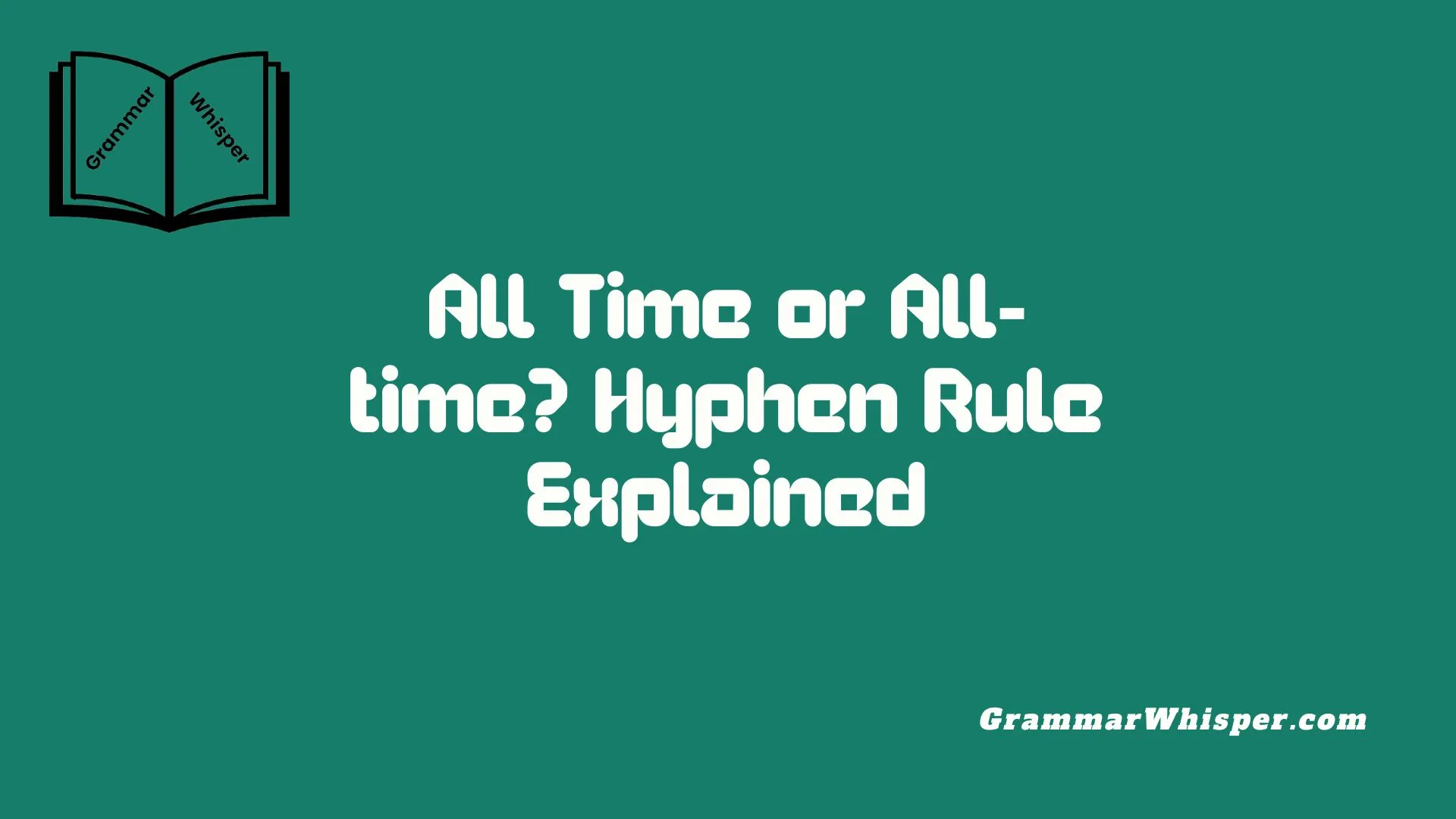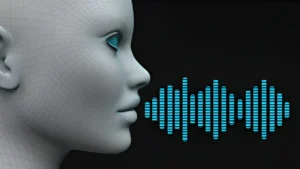I once helped a colleague refine a business report that casually included the phrase “All Time or All-time, nothing seemed wrong – but something about it rubbed me the wrong way. My internal editor instantly flagged it. With my deep grasp of the rules of English, I recognized that this wasn’t simply a matter of punctuation. It was about structural clarity. Like architecture, language depends on strong foundations, and every mark – especially a hyphen – acts as vital support. Use it correctly, and it can subtly but powerfully alter your message. The difference between “all-time” and “all time” may seem small – even identical to the eye – but the shift in meaning is massive. Say, “She’s an all-time great,” and it feels polished and clear. Remove the hyphen, and it becomes clunky and awkward, like a sentence missing its rhythm.
Having spent years editing everything from social media captions to long-form articles, I’ve seen the mistake far more often than you’d expect. A short guide can do wonders in helping writers learn when to use each version with accuracy. The problem? Most people fall into the trap of following grammar advice without ever really understanding the logic of hyphenation. It’s frequently misunderstood, especially in tricky, borderline cases. Whether you’re writing for online media, submitting a work summary, or perfecting your personal blog, knowing when to hyphenate can elevate your communication and sharpen your skills. Hyphens may be small, but in precise writing, they punch well above their weight.
Why Hyphenation Matters More Than You Think
A hyphen may seem like a tiny mark, but it carries weight in professional, academic, and everyday writing. It can:
- Change a sentence’s meaning
- Add clarity
- Eliminate ambiguity
Consider this example:
“He’s an all-time great.” vs. “He’s great all time.”
The first version clearly means someone is historically great. The second? It’s confusing and awkward – definitely not what you want in polished writing.
“All Time” vs. “All-time”: Quick Definition Snapshot
Let’s break down the definitions clearly:
| Term | Part of Speech | Function | Example |
| All-time | Adjective | Describes a noun with record-holding status | “She’s an all-time legend.” |
| All time | Noun phrase | Refers to indefinite time (no hyphen) | “She’s kind for all time.” |
Tip: If you’re using it to describe something, especially before a noun, hyphenate it.
What Is a Hyphen and Why Does It Exist?
A hyphen (-) is a punctuation mark used to join words and split single words at line breaks. But in modern English, its most important role is in compound adjectives – two or more words working together to describe a noun.
Hyphen vs. Dash: Don’t Confuse Them
| Symbol | Name | Usage |
| – | Hyphen | Links words (e.g., “all-time”) |
| – | En dash | Shows a range (e.g., “5–10 years”) |
| – | Em dash | Adds emphasis (e.g., “She ran – fast.”) |
When to Use “All-time” – The Adjective Test
“All-time” functions as a compound adjective. That means it’s used before a noun to describe something or someone that holds a record or has reached a peak over history.
Examples of “All-time” in Sentences:
- “Michael Jordan is an all-time great in basketball.”
- “That was an all-time high for cryptocurrency.”
- “This is my all-time favorite movie.”
Rule of Thumb:
If “all-time” describes a noun, it needs a hyphen.
It becomes part of a modifier phrase like:
- All-time record
- All-time score
- All-time performance
When to Use “All time” – The Literal Duration
“All time” is a noun phrase. It refers to a continuous or eternal span of time, usually in expressions like “for all time” or “of all time.”
Use Cases of “All time”:
- “She will be remembered for all time.”
- “The greatest of all time.”
- “This tradition will last for all time.”
In these situations, no hyphen is necessary because there’s no modifying noun immediately after.
Context Is King: Why Hyphenation Depends on Sentence Structure
The hyphenation of “all-time” depends heavily on where and how it’s used in a sentence.
Compare These:
- “He’s the all-time top scorer.” ✅ (Before noun = adjective = hyphen needed)
- “He is the top scorer of all time.” ✅ (Prepositional phrase = noun = no hyphen)
How to Test It:
- If you can remove “all-time” and the sentence still makes sense without changing structure, you’re likely using it correctly.
- If it feels like an adjective, hyphenate it.
- If it feels like a phrase or expression, don’t.
What the Experts Say: Style Guides & Dictionaries
Hyphen rules are not always universal, but major style guides and dictionaries provide consistent recommendations.
Style Guide Comparison
| Source | Rule Summary |
| AP Stylebook | Use hyphen in compound modifiers: “all-time best.” |
| Chicago Manual of Style | Hyphenate when modifying nouns before them; no hyphen in predicates. |
| MLA Handbook | Adjective = hyphen. Noun phrase = no hyphen. |
| APA Manual | Consistent with Chicago. Clarity prioritized. |
Dictionary Entries
| Dictionary | Entry on “All-time” |
| Merriam-Webster | “All-time” defined as “surpassing all others of all time.” |
| Oxford English | “All-time” used as a compound adjective. |
Real-Life Missteps: Common Errors with “All-time”
Even experienced writers make mistakes with hyphenation. Let’s spotlight the most common ones.
Don’t Do This:
- ❌ “He is an all time favorite.” (missing hyphen in compound adjective)
- ❌ “This is my all-time of favorites.” (awkward construction)
- ❌ “She’s great all-time.” (misplaced modifier)
Why These Are Wrong:
In most of these cases, the problem is forgetting that “all-time” modifies a noun, which demands a hyphen. Or worse, forcing “all-time” into a spot where a phrase or clause should go.
Other Hyphenated Compound Adjectives to Know
“All-time” isn’t alone. English is full of compound modifiers that follow similar rules.
Examples of Common Compound Adjectives:
| Phrase | Correct Form | Incorrect Form |
| “well-known author” | ✅ Well-known author | ❌ Well known author |
| “high-speed chase” | ✅ High-speed chase | ❌ High speed chase |
| “state-of-the-art” | ✅ State-of-the-art | ❌ State of the art |
| “part-time job” | ✅ Part-time job | ❌ Part time job |
| “long-term goal” | ✅ Long-term goal | ❌ Long term goal |
Note: These require hyphens only when placed before nouns.
Special Hyphen Rules: Ages, Numbers & Time Expressions
Some hyphenation patterns are so common they’re tested in professional grammar exams.
Examples:
- Ages: “A 5-year-old child” ✅ / “The child is 5 years old” ❌ (no hyphen needed)
- Numbers: “A 20-page book” ✅ / “The book has 20 pages” ❌
- Time spans: “A 10-minute break” ✅ / “The break lasted 10 minutes” ❌
| Rule Type | Hyphenated? | Example |
| Before a noun | Yes | “A 3-day weekend” |
| After a verb | No | “The weekend lasted 3 days” |
Tools & Tips for Catching Hyphenation Errors
Online Tools:
- Grammarly: Automatically suggests hyphenation in compound adjectives.
- Hemingway Editor: Highlights readability issues, including awkward phrasing.
- Merriam-Webster’s Learner Dictionary: Great for usage examples.
Personal Checklist:
✅ Is the word before the noun? ✅ Does it form a single modifier? ✅ Would the meaning change without a hyphen? ✅ Is it consistent with style guides?
Mini Quiz: Can You Spot the Hyphen?
Try identifying if the hyphen is used correctly:
- “That was an all time low.”
- “She’s an all-time record holder.”
- “He gave an all time performance.”
- “The show had an all-time high rating.”
Answers:
- ❌ (should be: all-time low)
- ✅
- ❌ (should be: all-time performance)
- ✅
Conclusion
The difference between “all time” and “all-time” isn’t just a question of grammar – it’s a matter of precision, tone, and reader experience.
If you:
- Want to describe a record-breaking quality → Use “all-time”
- Refer to eternity or a time period → Use “all time”
“Good writing is precise. Great writing is clear. The hyphen is a bridge to both.”
FAQs
What is the difference between “all time” and “all-time”?
“All-time” is a compound adjective used before a noun to describe something historically significant or record-setting, such as “an all-time favorite.” “All time,” without a hyphen, refers to an indefinite span of time, often seen in phrases like “for all time” or “of all time.”
Should I hyphenate “all-time favorite”?
Yes. When using “all-time” as a compound adjective to modify a noun (like “favorite”), it must be hyphenated. Example: “That’s my all-time favorite movie.”
Is it ever wrong to use the hyphen in “all-time”?
Yes. You shouldn’t hyphenate when “all time” is used as a standalone noun phrase, not modifying another word. For instance: “This is the best of all time.” Adding a hyphen here would be incorrect.
What style guides recommend using the hyphen in “all-time”?
Major style authorities such as the AP Stylebook, Chicago Manual of Style, MLA, and APA all recommend using a hyphen when “all-time” is used as a compound adjective before a noun.
Can I use “all-time” at the end of a sentence?
Yes, but only if it functions correctly within the sentence structure. If it’s modifying an implied noun, it can be fine. For example: “She’s the best of all-time greats.” However, in most cases, use “all time” at the end: “She is the best of all time.”











